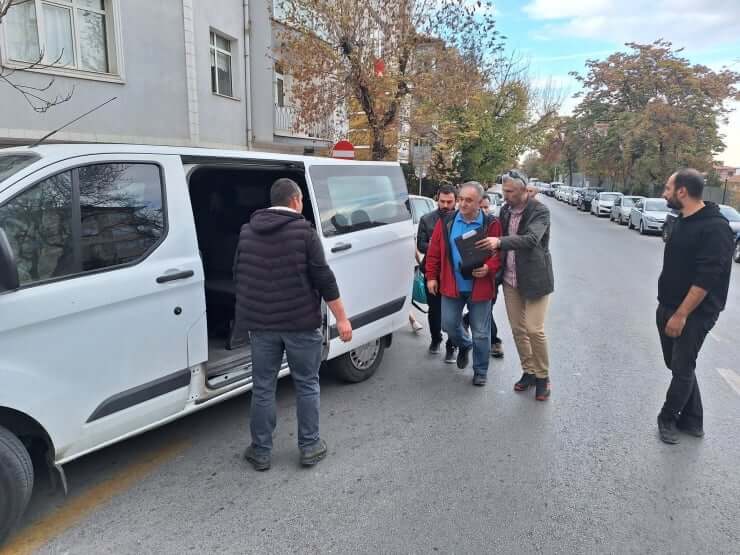The arrest of a veteran investigative journalist under a controversial law criminalizing disinformation following his report on alleged corruption in the Turkish judiciary, which was based on a document purportedly from the National Intelligence Service (MİT), has sparked widespread condemnation and concern for press freedom in Turkey.
Tolga Şardan’s arrest was made under the controversial “disinformation” law,” which criminalizes the dissemination of “false or misleading information” and stipulates prison sentences of between one and three years.
The law, which was passed in October 2022 and signed by President Recep Tayyip Erdoğan, has drawn widespread criticism from rights groups and the opposition for further restricting freedom of expression in Turkey.
The Constitutional Court announced on Thursday that it would discuss the potential annulment of the disinformation law on Nov. 8.
Şardan, a journalist working for T24 news website, was taken into custody after he claimed in an article the existence of a MİT report submitted to President Erdoğan describing corrupt practices among judges and prosecutors.
The İstanbul Chief Public Prosecutor’s Office charged Şardan with “public dissemination of misleading information” under Article 217/A of the Turkish Penal Code, which was amended by the 2022 Disinformation Law, a law that critics say is vaguely worded and prone to abuse.
The swift arrest and subsequent search of Şardan’s home have been interpreted by many as a warning to journalists and a blow to the already precarious state of press freedom in Turkey.
Doğan Akın, the editor-in-chief of T24, called the arrest “the most beautiful of disappointments,” highlighting the irony and dismay many feel at the fact that a journalist is being silenced.
Akın’s article also questions the legal grounds for Şardan’s arrest and suggests that the response to his reporting was disproportionate and indicative of a broader attack on the critical press.
T24 reported that in his defense, Şardan told the prosecutor, “I was doing my job in order to inform the public.”
Şardan’s lawyer argued that the article should be considered a tipoff warranting investigation of the allegations rather than grounds for the arrest of the journalist who elaborated on them.
The presidency denied the existence of the MİT report shortly after Şardan’s arrest.
Şardan stands by his story.
“Sardan wrote what the public needed to know, he did his duty, and should be released,” Agence France-Presse quoted Erol Önderoğlu, the Turkish representative of Reporters Without Borders (RSF), who is himself charged with “terrorism,” as saying.
Şardan’s arrest has also prompted press organizations, opposition politicians and human rights groups to voice their dissent.
Journalists and advocates for press freedom are not shocked by the arrest of Tolga Şardan, citing the increasingly frequent invocation of Turkey's so-called censorship law against members of the media | ✍️ Barış Altıntaş (@barisalt)
🔗https://t.co/x42ASkXzon pic.twitter.com/vmdIXU9bwR
— MLSA (@mlsaturkey) November 2, 2023
Eight press organizations, including the Press Council and the Association of Contemporary Journalists, issued a statement calling for Şardan’s immediate release and terming the arrest an attempt at intimidation.
His colleagues gathered outside the T24 office in Ankara to protest his arrest.
Şardan’s arrest is part of a larger pattern of arrests and detentions, as weeks earlier eight people, including two journalists, were arrested on the same charges of spreading disinformation on social media as well as the charge of fomenting enmity.
International human rights organizations such as Amnesty International and Article 19 have already criticized the disinformation law, stressing that the charges that may result from the law are disproportionate and that the law’s vague terminology could lead to it being misused to suppress dissent.
They criticized the government’s control over the media and suggested that the law curtails freedom of expression.
Kemal Kılıçdaroğlu, leader of the main opposition Republican People’s Party (CHP), tweeted that journalism is not a crime. This opinion was shared by other opposition members, who consider the arrest an attack on democratic principles and the public’s right to information.
Tolga Şardan gazetecidir, #GazetecilikSuçDeğildir https://t.co/kNcCKWjbnA
— Kemal Kılıçdaroğlu (@kilicdarogluk) November 2, 2023
Erdoğan’s far-right ally, the Nationalist Movement Party (MHP), through its deputy chairman Feti Yıldız, defended the legal proceedings, stressing the “danger” posed by the spread of false information and its potential to disrupt public order.
Following Şardan’s arrest, the BirGün daily reported that three of its journalists were also under investigation on allegations of spreading disinformation after Fatih Erdoğan, the owner of Pasifik İnşaat and husband of ruling Justice and Development Party (AKP) deputy Asuman Erdoğan, filed a complaint, raising further concerns about the reach of the disinformation law.
The prosecutor’s office launched an investigation into Birgün daily editor Uğur Koç and journalists Uğur Şahin and İsmail Arı after Erdoğan filed the complaint over an article on corruption allegations.
The disinformation law has been harshly criticized by the Council of Europe for potentially increasing self-censorship, especially in the context of the May elections.
Turkey’s media landscape has been tightly controlled since a failed 2016 coup has resulted in most traditional media outlets falling under the government’s influence. Despite this, social networks and internet-based media had remained relatively uncontrolled until regulations were tightened in recent years, including requiring social media companies to appoint local representatives to comply with orders to remove content.
According to RSF, 90 percent of the national media in Turkey, which was ranked 165th among 180 countries in the RSF’s 2023 World Press Freedom Index, is owned by pro-government businessmen and toe the official line.

